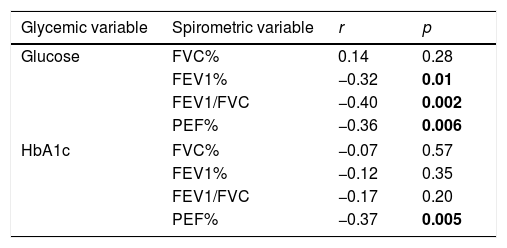Diabetes mellitus can affect the lungs, in its various structures and functions. Current research is being conducted to establish the clinical impact of hyperglycemia on lung function. The objective of this study is to determine if the glycemic state (euglycemic, prediabetes or diabetes) is associated with a decrease in lung volume, determined by spirometry.
Patients and methodsAn analytical cross-sectional study was carried out at the Ticomán General Hospital in Mexico City. Glucose and glycosylated haemoglobin concentration were used as the parameters to determine if the subjects had a glycemic disorder. They were further categorised into euglycemic, prediabetic and diabetic subjects according to ADA criteria guidelines. The subjects underwent forced spirometry testing, obtaining expiratory volume at the first second (FEV1), forced vital capacity (FVC), FEV1/FVC ratio, and peak expiratory flow (FEP). The lung volumes between the groups were compared.
ResultsA total of 55 subjects were studied; 43 women, and 12 men; 14 euglycemic, 9 prediabetic, and 32 with diabetes. Diabetic individuals presented a %FEP decrease compared to the prediabetic and euglycemic subjects. The fasting serum glucose values correlated with decrease of %FEV1, FEV1/FVC and %FEP, while the HbA1c concentration only correlated with the decrease of %FEP.
ConclusionsSubjects with diabetes have a lower %PEF than euglycemic and prediabetic subjects, while the %FEV1, %FVC and the FEV1/FVC ratio do not vary between the different glycemic states. Acute glycemic non-control correlated with a decrease in more spirometric parameters than chronic glycemic non-control.
La diabetes mellitus puede afectar a los pulmones en diversas estructuras y funciones. Actualmente, se están realizando investigaciones para establecer la repercusión clínica de la hiperglucemia sobre la función pulmonar. El objetivo de este estudio es determinar si el estado glucémico (euglucémico, prediabetes o diabetes) se asocia con la disminución de los volúmenes pulmonares determinados mediante espirometría.
Pacientes y métodosSe trata de un estudio transversal analítico, realizado en el Hospital General Ticomán de la Ciudad de México. A los participantes se les determinó la concentración de glucosa y hemoglobina glucosilada (HbA1c), para establecer si eran portadores de un trastorno glucémico. A todos ellos se les realizó una espirometría forzada, obteniendo el volumen espiratorio al primer segundo (VEF1), la capacidad vital forzada (CVF), la relación VEF1/CVF, y el flujo espiratorio pico (FEP). Se categorizaron los pacientes en sujetos euglucémicos, prediabéticos y diabéticos según los criterios de la ADA. Se compararon los volúmenes pulmonares entre los grupos.
ResultadosSe estudiaron un total de 55 sujetos, siendo 43 mujeres y 12 hombres. De esta muestra, 14 eran euglucémicos, 9 prediabéticos, y 32 diabéticos. Los individuos diabéticos presentan una disminución del %FEP comparados con los sujetos prediabéticos y los euglucémicos. Los valores de glucosa sérica en ayuno correlacionan con la disminución del %VEF1, VEF1/CVF y %FEP, mientras que la HbA1c solo se correlaciona con la disminución del %FEP.
ConclusiónLos sujetos con diabetes presentan un %PEF menor que los sujetos euglucémicos y los prediabéticos, mientras que el %VEF1, %CVF y la relación VEF1/CVF no varían entre los diferentes estados glucémicos. El descontrol glucémico agudo se correlaciona con la disminución de más parámetros espirométricos que el descontrol crónico.












